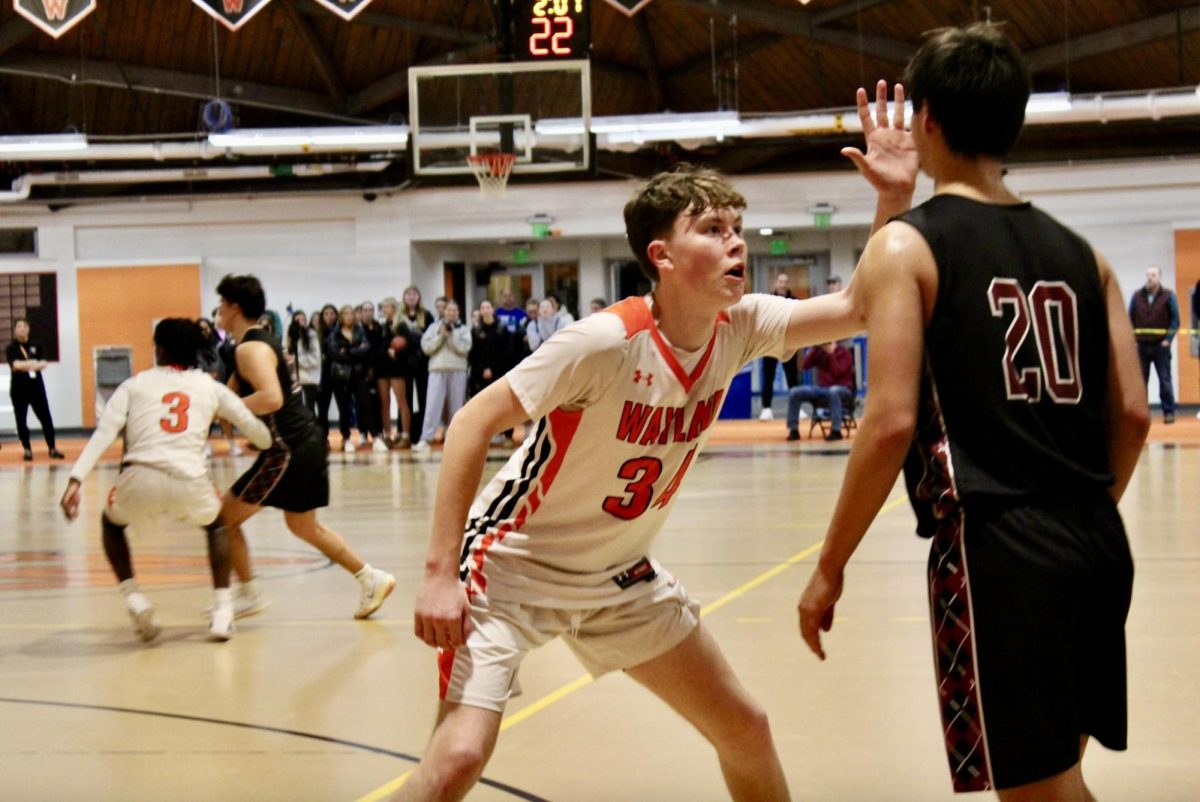
We all have those nights when the amount of time we spend on our homework surpasses the number of hours we spend actually sleeping. We beat ourselves up for procrastinating on that biology presentation, curse our English teacher for giving us a “small essay” due the next day and damn our math, history and french teachers for giving us tests, projects and homework all at the same time.
But that’s just the way school is, and those piles of homework are there for a reason, right?
Well, sort of. According to guidelines endorsed by the National Education Association (NEA), schools should be following the “10 minute rule” created by Harris Cooper of Duke University, the country’s leading homework researcher.
The “10 minute rule” states that students should be doing 10 minutes of homework per night, per grade level. For example, second graders should complete 20 minutes of homework per night, fifth graders should do 50 minutes per night and so on.
Cooper’s rule also states that by the time a child of any age reaches two hours of homework, they stop effectively taking in the material, and the homework will not affect their achievement. The average American high school student does two to four hours of homework a night, so according to Cooper’s rule, high school students could be anywhere between 12th to 24th grade.
Obviously something is wrong here. We shouldn’t be taking on more than we are capable of, but why is homework such an issue all of a sudden?
According to a 2004 national survey of 2,900 American children conducted by the University of Michigan, the amount of time spent on homework is up 51% since 1981. With the leap in homework, William Crain, Ph.D., a professor of psychology at City College of New York and the author of Reclaiming Childhood, said that the average high school student is glued to his or her desk for almost seven hours a day, has two to four hours of homework each night, and in total is working 45 to 55 hours a week.
So who’s to blame for why we sit at our desks night after night, feeling our brains melt into the back of our skulls as we reach our third hour of what Harris Cooper dubs, “counterproductive homework?”
As easy as it is to say that our teachers are the ones to blame because they are handing out the homework, that is not necessarily correct. True, maybe some teachers favor ten page papers more than others, but the real answer for why we have so much homework is a little thing called top down pressure.
In 2001, The No Child Left Behind Act (NCLB) was established, requiring states to create assessments in basic skills in order to receive federal funding for their schools. NCLB supports standards-based education reform, which is based on the belief that setting high standards and establishing measurable goals can improve individual outcomes in education.
Since NCLB, there’s been a huge push for high test scores, which means covering everything from the ancient Sumerians to historians’ predictions for the future in only 180 days. Add the fact that schools for educators don’t offer “Assigning Homework 101,” and teachers are figuring this out on their own.
“Today’s educators are getting pressure from state school boards to cover more material and in greater depth – all without a corresponding expansion of the school day,” said Harris Cooper. “Students are spending homework time learning extra material rather than reviewing the day’s lessons.”
However, the thing that our country needs to understand is that the challenge of achieving high test scores and managing education can’t be met with an abundant amount of homework.
According to Etta Kralovec and John Buell, educators and co-authors of the book, The End of Homework, homework also doesn’t allow teachers to see how a student is progressing. A student may struggle and make many mistakes without the teacher being able to pinpoint the problem or even notice that the student has made an error in the first place. This ultimately hurts the student’s learning process and grades. Also, studies and statistics show that countries with lesser amounts of homework, such as Japan, Denmark and the Czech Republic, report higher test scores than the countries that assign the most homework.
Luckily, as the homework issue has become more prominent, there have been some shifts in ideals, and some schools are making progressive changes to their homework policies. Mason-Rice School in Newton, MA now follows Harris Cooper’s “10 minute rule” to keep a handle on nightly assignments.
Raymond Park School in Indianapolis, IN wrote a policy instructing teachers to “assign homework only when you feel the assignment is valuable” and that “a night off is better than homework which serves no worthwhile purpose.” Other schools, such as Oak Knoll Elementary School in Menlo Park, CA, have even considered eliminating homework altogether.
The bottom line is, homework has evolved into an unhealthy way of life for American students. Somewhere along the road, homework became a safety net for teachers to cover extra material that they are impossibly expected to teach us. It became a way to put us all at ease, convincing ourselves that our education programs are succeeding because they have been meeting the state standardized bar. But now, it’s time to face the facts. Homework has a time, place and use, but like anything else, there can be too much of a good thing. It’s time to start a homework revolution.





![Last Wednesday, the Wayland School Committee gathered to discuss a number of topics regarding the health curriculum and Innovation Career Pathway course. Another large topic of conversation was the ways to potentially mitigate distracting cell phone usage. "These [phones] are going to distract your learning and social relationships," Superintendent David Fleishman said. "That's concrete right there."](https://waylandstudentpress.com/wp-content/uploads/2025/06/Screenshot-2025-06-04-at-9.49.31 PM-1200x886.png)






























hiyou • Dec 15, 2011 at 9:40 PM
I think that with less homework, students will ultimately get a bit more sleep and be more awake and attentive in class. I also think that having less homework would make students more interested in the subject. For example, if you are studying a topic you like but have to do 20 problems/questions on, the subject loses its uniqueness and becomes work instead of interesting.
Nicholas Bryan • Dec 10, 2011 at 1:07 PM
Homework, probably since its inception, was designed to reinforce learning, not to introduce new material. This article correctly states that teachers are using homework to "cover" more material. Covering material is not teaching/learning material. In this case, more is not better.
Well written, thoughtful article.
Nice job, Fay & O'keefe!
jdaklsjlksa • Dec 7, 2011 at 8:08 AM
wow will you noobs stop crying QQ MOAR jeez suck it up it's hw
metacom • Dec 6, 2011 at 5:31 PM
very well written. I would probably be happy if I didn't have so much homework.
capt. overworked • Dec 6, 2011 at 5:27 PM
the amount of homework has gotten so large that i can't a) do as many extra-curriculars as i would like, b) get to the gym as much as i would like c) i can't hang out with my friends as much. on the weekends, i probably do 6 hours of homework. it's ridiculous how much homework is given.
anon • Dec 6, 2011 at 1:44 PM
Their estimate of homework is definitely low…there are some nights I do around 12 hours of homework/ studying. Sometimes I don't have time to sleep. And nights when I work like that, I WANT to go to bed, so I only get up to eat or go to the bathroom. I definitely budget my time effectively, I work in the media center during all my frees, I even skip lunch most days, and I still don't have time to sleep. And teachers say that sleep should come first, but I think they're forgetting that most of us aren't willing to sacrifice our grades just so we can sleep. In the end, it's the grades we get that colleges see, not how much sleep we get. It's getting to the point where kids in middle school and elementary school aren't sleeping enough. My sister is in middle school and rarely gets 8 hours of sleep because she has so much homework.
mesao • Dec 6, 2011 at 5:29 PM
you're definitely a really slow worker
u will never know • Dec 6, 2011 at 1:38 PM
this is a great article, now we need to put it to use. make signs and stuff. lets go, homework revolution!!!
hiiiiiii • Dec 6, 2011 at 1:11 PM
I totally agree with this!
Anon • Dec 6, 2011 at 7:38 AM
There absolutely lies a problem with America's standardized testing system, and there are students who are given too much homework, but I think we need to look at a mixture of good study habits and reasonable homework — a compromise. I see way too many students not working or budgeting their time effectively during their frees. I'm a junior who takes 4 honors classes and 1 AP, and when I budget my time well, I rarely have more than 2 or 2 1/2 hours of homework. A little less would be good, but I feel this article misses the point.
mesao • Dec 7, 2011 at 2:09 PM
you're definitely a really fast worker
jhgisk • Dec 7, 2011 at 5:30 PM
obviously you are smarter than most people which means that you can finish your work faster and understand things better than the rest of us. So add an extra hour on to the time you spend, plus if you have 2 frees a day, that's 2 hours so someone else is probably spending 5.5 hours
Eduinterested • Dec 6, 2011 at 2:15 AM
Thank you for bringing light to a serious problem with the American education system. We're now bogged down in the bureaucracy of standardized tests and set curriculum. Learning is as much a skill to develop as it is activity for students. It should be fun in its own way, it should be engaging. The homework (over)load hinders learning, retention, and the cultivation of a love of learning.
Now how about some commentary on the state of grading! Excellent article.